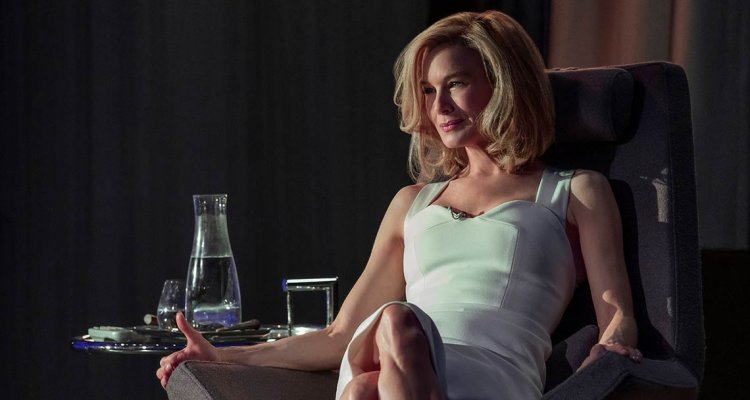Personal sacrifice is one of the cornerstones of elite success. The notion can be broken down by the perception of financial achievements, the commodification of investitures, or pristine appearance. But it all comes at the cost of personal growth. This isn’t doctrine, exactly, but for Anne Montgomery (Renée Zellweger) it’s a foundation. And in Netflix’s “What/If,” it’s one of many half-formed platitudes that acts as a touchstone of the larger game the unremarkable characters play into.
The launching vehicle for Zellweger’s next phase of her career, “What/If” sees the Oscar-winning actress take on the sultry role of Anne Montgomery, a wealthy woman with investment, and personal, games to be played at the apprehension of Lisa (Jane Levy) and Sean Donovan (Blake Jenner). What starts off as a circumstance pulled straight out of “Indecent Proposal” as Anne propositions the couple with the opportunity to save Lisa’s medical company, but only if the eccentric millionaire can spend a night with Sean, turns into a chaotic chess game with multiple boards and moving pieces. While Sean and Lisa are squaring off with Anne and the secrets of their respective pasts, their friends Todd and Angela are having a domestic crisis of their own. On the other side of San Francisco, Lisa’s adoptive brother, Marcos, undergoes momentary personal and career crises one right after the other. Plot lines intersect, dark and disturbing truths comes to light – it’s all curated chaos, but simple chaos to watch unfold.
“What/If” begins with an intriguing premise and enigmatic character for Zellweger to strut in, complete with stunningly cut threads and beautiful evening gowns. But as the main narrative twists and turns, the subplots that are only connected to the main event by simple character association mar the fascination of Anne Montgomery; and, as consequence, patience with the show.
The series’ problems mainly begin when its perceived self-awareness starts to run away from itself. As Anne Montgomery, Zellweger seems to inhabit the take on a noir villain with absolute ease and a healthy dose of campiness. But as the episodes wear on and the many narratives begin to run away from each other, the metaphors and prosaic language come off with a sincerity that feels like the show is trying everything to maintain audience interest. With every annoyingly attractive cast member, there is an equal amount of banal dialogue to communicate the soapy narratives playing out.
With the main plot of the show, however, involving Lisa, Sean, and Anne, the series does have a narrative worth exploring. Implications of the sacrifices needed for success juxtaposed by the perception of what success ultimately means to the individual three has a foundation for a show that would be worthwhile. It’s a psychological thriller that plays to a sleek design, and while the soap opera flare could offer more introspection to be desired, the main narrative would, if offered the intentional focus, offer a fascinating cat versus mice game.
And that’s not to say the various subplots don’t offer any intrigue either. Rather, the subplots of the combatting supporting characters each have worthwhile stories and themes to examine. The problem is the focus shifts so abruptly between internal character examination to domestic pitfalls that it is hard to keep up and as a result, most of the otherwise fascinating stories are made simplistic by the dialogue and narrative clichés; there’s too much to invest in.
As a summer binge, the show is an easy watch. It’s practical about moving its characters to-and-fro and saving its best twist right for the end, delivered with great precision by Zellweger and Levy. While the look of the show does not precisely match its tone, it’s vague enough to at least seem like it all works, to stay fairly clean even among the convoluted, messy choices and dialogue. On the whole, the series starts off fascinating, though heavy handed, and from there spirals into different directions. Cleaning off the soot, it blazes off with an invigorating final two episodes that pull everything together for the main players and their supporting pawns.
In the San Francisco setting of the series, lightning strikes often, practically in every episode. But the moody weather almost acts like an extension of the show in that lightning does strike every once and while but not often enough. Still, when it comes to the question of whether or not apprehensive audiences should watch “What/If,” the honest answer that can be offered is, “eh, why not?” [C]

